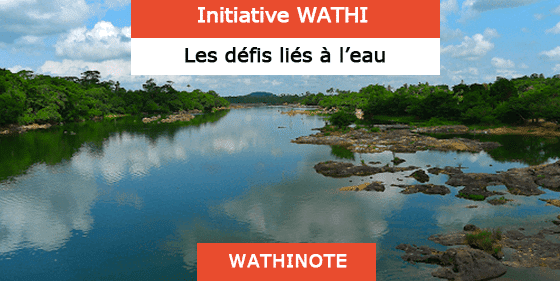

Authors: Laura Bonzanigo, Marie-Laure Lajaunie, and Richard Abdulnour
Affiliated organisation: World Bank
Site of publication: www.blogs.worldbank.org
Type of publication: blog
Date of publication: 3 March 2022
Over the last 20 years, the World Bank has invested US$714 million in 10 regional projects in the four major transboundary river basins in West Africa—Senegal, Niger, Lake Chad, and Volta. The Cooperation in International Waters in Africa (CIWA) program, a multi-donor trust fund that supports Sub-Saharan African countries to unlock the potential for sustainable, climate-resilient growth by addressing constraints to cooperative water resources management, has been an important partner of the World Bank in West Africa.
Today, the World Bank has two ongoing projects in the Senegal and Niger basins, with the former closing at the end of this year, and yet the need for cooperation in transboundary waters has never been as urgent.
In the Senegal Basin, 20 years of World Bank engagement with the Senegal River Basin Organisation (in French, the Organisation Pour la Mise en Valeur du Fleuve Sénégal (OMVS)) facilitated the successful integration into OMVS of Guinea, home to the river’s headwaters; significantly improved information-sharing, and developed, adopted, and implemented a Basin Master Plan and cost-sharing formula
World Bank engagement in water resources management in West Africa has consisted primarily of regional projects. An initial wave of regional grants from the Global Environment Facility (GEF) and CIWA enabled the World Bank to engage with the four largest West African basins with established River Basin Organizations (RBOs) and with the most potential benefits from riparian cooperation over shared water resources.
In the Senegal and Niger basins, these grants led to long-term regional lending programs. In the Lake Chad and Volta basins, grant implementation was more challenging for structural reasons that impeded cooperation, resource mobilization issues, and project design flaws. As a result, and despite progress made on institutional strengthening, no lending programs followed the initial grant in these two basins.
However, today, with CIWA’s support, the World Bank remains engaged with the Lake Chad Basin Commission because the lake is a fragility hotspot and a high priority for World Bank management. CIWA’s Lake Chad Transboundary Cooperation initiative aims to develop an analytical and institutional foundation for water security and design activities to support future investments in the region.
The lending programs for the Senegal and Niger basins have had many notable impacts:
In the Senegal Basin, 20 years of World Bank engagement with the Senegal River Basin Organisation (in French, the Organisation Pour la Mise en Valeur du Fleuve Sénégal (OMVS)) facilitated the successful integration into OMVS of Guinea, home to the river’s headwaters; significantly improved information-sharing, and developed, adopted, and implemented a Basin Master Plan and cost-sharing formula.
The cost-sharing formula makes OMVS one of the few RBOs in the world (and the only one in Africa) to fully co-own river infrastructure.
However, today, with CIWA’s support, the World Bank remains engaged with the Lake Chad Basin Commission because the lake is a fragility hotspot and a high priority for World Bank management
In the Niger Basin, the World Bank’s 15-year engagement with the Niger Basin Authority (NBA) has contributed to the sustainable and shared management of basin resources, including critical decisions on infrastructure. The World Bank support proved essential in preventing irreversible decisions about the Fomi Dam, by abandoning the initial site that would have resulted in tremendous negative environmental and social impacts and offset the expected economic benefits.
Finally, World Bank engagement helped develop, adopt, and implement a shared vision process, water charter, and a US$3.11 billion climate resilience investment plan that was presented at COP21 in Paris, and with which the NBA has already successfully leveraged significant investments.
CIWA has been an important partner in the World Bank’s engagement with the Nile Basin Authority, financing both recipient- and Bank-executed technical assistance.
Overall, the World Bank’s engagement in transboundary waters still has limitations in several areas. The World Bank’s regional and national engagements were conducted mostly independently, despite the need for coordination and mutual reinforcement.
There has also been limited attention given to transboundary aquifers despite their potential for climate resilience. Though improving today, over the past two decades, other high-priority areas were not given enough attention, namely gender and social inclusion; fragility, conflict, and violence; and nature-based approaches, which also require a strong cross-sectoral approach.
Les Wathinotes sont soit des résumés de publications sélectionnées par WATHI, conformes aux résumés originaux, soit des versions modifiées des résumés originaux, soit des extraits choisis par WATHI compte tenu de leur pertinence par rapport au thème du Débat. Lorsque les publications et leurs résumés ne sont disponibles qu’en français ou en anglais, WATHI se charge de la traduction des extraits choisis dans l’autre langue. Toutes les Wathinotes renvoient aux publications originales et intégrales qui ne sont pas hébergées par le site de WATHI, et sont destinées à promouvoir la lecture de ces documents, fruit du travail de recherche d’universitaires et d’experts.
The Wathinotes are either original abstracts of publications selected by WATHI, modified original summaries or publication quotes selected for their relevance for the theme of the Debate. When publications and abstracts are only available either in French or in English, the translation is done by WATHI. All the Wathinotes link to the original and integral publications that are not hosted on the WATHI website. WATHI participates to the promotion of these documents that have been written by university professors and experts.
